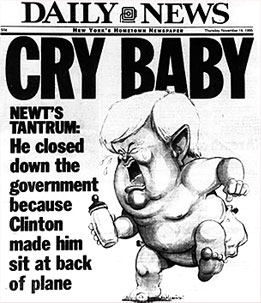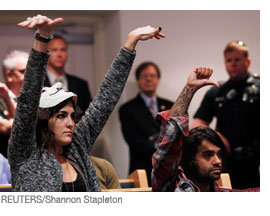Unless the citrus gods have a last minute change of heart, former House Speaker Newt Gingrich should lose handily to former governor Mitt Romney in today’s Florida primary – and for good reasons. Gingrich came off his stunning South Carolina victory ten days ago with enormous momentum and the opportunity to derail Romney’s once invincible-looking campaign while unifying the conservative wing of the GOP and tea party into an awesome force.
It was a chance of a lifetime. Instead, an overconfident and underprepared Gingrich walked into a Romney ambush in Florida, where he was torn to shreds by Super PAC negative ads and where he essentially mailed in two GOP debate performances. Gingrich let Romney define him as erratic, greedy and an embarrassment to his party – someone who left Congress “in disgrace” and then made his fortune on K Street as an “influence peddler” for Freddie Mac and other reviled institutions. Once Gingrich stumbled through and triggered those landmines, it was only a matter of time before Romney’s huge, 5 to 1 advantage in spending for TV ads in the sprawling Florida media market finished him off.
For sure, Florida won’t be a knock-out punch for Gingrich -- the former Georgia congressman has vowed to stay in the race “through the convention,” where he hopes that the sizeable “Anybody-But-Romney” forces will rally to his side. Twice before, Gingrich’s campaign tanked to the point that the news media and campaign experts wrote him off, and twice he came roaring back. So it’s risky to totally count him out. But there will be plenty of post-mortems offered in the coming days trying to make sense of Gingrich’s collapse in Florida. Here are five factors that may have had the biggest impact:
 • Nobody likes a crybaby. The New York Daily News had it right back in November 1999 when it carried a front-page cartoon of a crying baby Newt in diapers throwing a tantrum after President Clinton put him in the back of Air Force One and ignored him on a trip to a funeral in Israel. Gingrich was so angry that he returned to Washington and shut down the government – and then admitted he did it for spite.
• Nobody likes a crybaby. The New York Daily News had it right back in November 1999 when it carried a front-page cartoon of a crying baby Newt in diapers throwing a tantrum after President Clinton put him in the back of Air Force One and ignored him on a trip to a funeral in Israel. Gingrich was so angry that he returned to Washington and shut down the government – and then admitted he did it for spite.
Gingrich rose to power in the House by ruthlessly portraying his Democratic foes as crooks, traitors and taxaholics. Yet he seems genuinely shocked that the Romney forces have hammered away at his greatest vulnerabilities: namely that his own GOP House troops forced him out of office after a disastrous 1998 mid-term election, and that he was reprimanded by the House for an ethics violation and later paid $300,000 to cover the cost of the prolonged ethics investigation.
Romney has argued convincingly that rather blowing the horn on improper activities by mortgage giant Freddie Mac, Gingrich and his Washington consulting group took $1.6 million in fees for providing advice and “historic” context to the housing crisis. Gingrich has spent much of the past week crying about Romney distortions of his record and doing his best to trash Romney’s reputation. He has called him a Massachusetts moderate, a “liberal” and the biggest liar to ever run for president – making reconciliation within the party nearly impossible later this year. His message is clear: if I don’t get the nomination, then Romney will go down in November.
• Women are turned off by Newt. Many voters are willing to cut their political leaders a little slack when it comes to marital indiscretions. The fact that former President Bill Clinton enjoys enormous popularity in political retirement despite the Monica Lewinsky/impeachment imbroglio is a testament to that fact. But even under the best of circumstances, it’s tough to win the presidency after two messy divorces and a third marriage to a long-time mistress. (Republican Sen. John McCain of Arizona had a tough enough time running for president in 2008 with just one divorce in his background.)
 When Gingrich’s second wife, Marianne, told ABC news that her former husband had asked her for an “open marriage,” and CNN’s John King made the mistake of asking Gingrich about it as a lead off question in the South Carolina GOP debate Jan. 19, Gingrich masterfully turned the question against King and the “elite media” and used the rude inquiry as a rallying cry to win the primary. But once the details of Gingrich’s messy marriages began to sink in more, women voters had to wonder whether Gingrich’s situational ethics represented the values they want in a president.
When Gingrich’s second wife, Marianne, told ABC news that her former husband had asked her for an “open marriage,” and CNN’s John King made the mistake of asking Gingrich about it as a lead off question in the South Carolina GOP debate Jan. 19, Gingrich masterfully turned the question against King and the “elite media” and used the rude inquiry as a rallying cry to win the primary. But once the details of Gingrich’s messy marriages began to sink in more, women voters had to wonder whether Gingrich’s situational ethics represented the values they want in a president.
Romney led Gingrich by 15 percentage points among all likely Florida Republican voters in an NBC/Marist poll released on Sunday. Yet among female voters, Romney led by 21 percentage points. In polls, Gingrich had problems among women, who were far less likely to support him. Media interviews with women voters over the weekend indicated that while many admire Gingrich’s conservative views and command of the facts, they feel he is carrying too much personal baggage for their taste. Asked by reporters why he was having problems with women voters in recent polls, Gingrich replied: “I have no idea.” Think again, Newt.
• Newt totally flopped in the debates. One of the strongest arguments that Gingrich supporters have proffered for their candidate is that the loquacious politician, historian and author would run circles around President Obama in the fall presidential debates, while the relatively inarticulate Romney would be steamrollered by the president. Gingrich has vowed to challenge Obama to a series of three-hour Lincoln-Douglas-style debates to show his stuff. He bowled over Romney and his two other rivals in South Carolina with a performance that incited conservatives, Tea Party adherents and assorted party yahoos. But by the time he reached sunny Florida, he didn’t have many more rhetorical tricks in his bag besides channeling the anger and prejudices of his party’s right wing.
Maybe the portly, 68-year old Gingrich was simply tired from long days on the campaign trail or maybe he suffered from a terminal case of overconfidence. But it appeared as if he hadn’t put a lick of work into preparing for either debate, while Romney – running scared after losing in South Carolina – was masterful and well armed with opposition research. Gingrich complained that NBC’s ground rules for the Monday night debate muted the energy of his supporters and hurt his performance. Yet he wasn’t any better at the Thursday night debate sponsored by CNN where partisans could shout and cheer on their candidates. Gingrich’s other excuse – that he was literally stunned into silence by the enormity of Romney’s distortions of his record – bordered on the pathetic. Perhaps the nadir of his performance came in the Thursday night debate in Jacksonville, when Gingrich berated the wealthy Romney for investing in Freddie Mac. Romney coolly replied, “Have you checked your investments?”, noting that Gingrich, too, had invested in Freddie though a mutual fund. Caught totally flatfooted, the only response Gingrich could manage to muster was “all right.”

• Newt’s numbers don’t add up. Gingrich says he’s the legitimate heir to the Reagan political legacy and boasts incessantly that he helped balance the federal budget four years in a row during the Clinton administration (although he was out of office during the last two budgets). Now he is vowing to balance the budget again and even produce a surplus if he is elected president. This would be accomplished through a combination of budgetary and fiscal measures to control spending and spur economic growth, and would be locked in with enactment of a balanced budget amendment to the Constitution.
Gingrich’s pledge of a 15 percent flat tax, while eliminating the estate and capital gains taxes and reducing the corporate rate from 35 percent to 12.5 percent, would blow a large hole in the budget and send the deficit soaring by reducing federal revenues by $1.28 trillion-- roughly a 35 percent reduction. For sure, Gingrich has yet to propose specific levels for federal spending in the coming decade, so there’s no way of knowing exactly how he intends to control the deficit. Like Reagan, he hopes to grow the economy out of the deficit with his economic initiatives. But by vowing to oppose deep cuts in the military, touting a truly cockamamie idea to build a colony on the moon, and pandering to just about every economic and special interest in Florida, it’s hard to see how he would do anything but send the l $15.3 trillion national debt skyrocketing even more.
• The chickens came home to roost. Though he has spent the past 40 years in Washington and lives with his wife, Callista, in a tony suburban Virginia neighborhood, Gingrich is running as an outsider doing battle with the “Washington Establishment.” He has long been most comfortable in this role, which he has used to great effect in winning a House seat in Georgia, rising to power in the House GOP caucus, engineering the Republican takeover of the House in 1994, and leading his party for five stormy and eventful years.
For decades, however, Gingrich coexisted with – and indeed was part of -- the Washington Establishment, a group of perhaps a couple hundred political leaders, lobbyist, business leaders, columnists and TV personalities who exercise outsized influence on the thinking and direction of the party. In the process, he made some mortal enemies, including former President George H.W. Bush, who to this day says Gingrich double-crossed him in 1990 during negotiations with Democrats on a crucial budget and tax deal and cost him reelection. Former senator and presidential candidate Bob Dole of Kansas said Gingrich’s decision to shut down the government in late 1994 and early 1995 hurt Dole’s chances to unseat President Clinton.
“I have not been critical of Newt Gingrich but it is now time to take a stand before it is too late,” Dole said in an extraordinary statement last week endorsing Romney. “If Gingrich is the nominee it will have an adverse impact on Republican candidates running for county, state, and federal offices. Hardly anyone who served with Newt in Congress has endorsed him and that fact speaks for itself. He was a one-man-band who rarely took advice. It was his way or the highway.”
In Washington, as elsewhere, you can’t treat colleagues and allies like dirt and not expect it to come back to haunt you. Only a few of the Republicans who worked closely with Gingrich in Congress, including former Rep. Robert S. Walker of Pennsylvania, have anything good to say about him. Yet the GOP mandarins’ backlash against Gingrich has more to do with electability than seeking revenge. The Republican Establishment is worried that if Gingrich ends up heading the ticket, their party will go down in flames in November, taking with it many lawmakers and governors. While Romney is running nearly even with Obama in head-to-head polling, Gingrich trails by double-digit margins.





